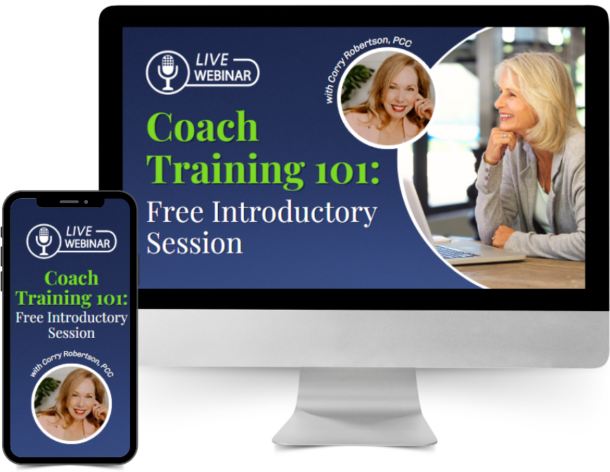Length of time to read: 8 minutes
A certificate of coaching is one of the most important things a professional coach can obtain. Why? It’s the professional acknowledgment and recognition that you’ve acquired the necessary skills and knowledge to become an effective professional coach. Additionally, it provides a solid foundation and sets a standard of competence in the coaching field that every aspiring coach should be made aware of.
Coaches are gifted and knowledgeable people with a calling to make the world a better place by improving other people’s lives. We do this by helping our clients connect with their path to success when it comes to their career, personal growth, relationships, or any other area in their life journey. And so, because coaches tap into intimate aspects of people’s lives, they need to be someone clients can trust to have the right skills and understanding.
When it comes to ensuring a coach’s bona fide training, certification is the golden standard. If you’re stepping into this exciting field and keen on understanding the ins and outs of being a certified coach, consider this your sneak peek into the topics we’ll be exploring:
Table of Contents
What Is Coaching Certification?
Why Get A Coaching Certificate?
How Do I Become A Certified Professional Coach?
What are the different Coaching Certification Programs?
How Long Does Coach Training Take?
Which Is Better, ICF or EMCC?
What Is the Difference Between CPC and PCC?
Is ICF Coaching Certification Worth It?
Which Is the Best Coaching Accreditation?
What Is the Highest Coaching Certification?
What Is the Career Pathway for Being a Professional Coach?
Let’s begin!

What Is Coaching Certification?
Like any other profession, getting a coaching certification means you’ve completed the necessary training to acquire the skills to fulfill your job. It’s proof that you’ve developed a certain degree of competency to carry out your role and provide quality services to your clients.
Coaching certification is a formal recognition and validation process that confirms your proficiency and competence in the field of coaching. It involves completing structured training programs and meeting established criteria set by reputable coaching organizations. A coaching certification signifies that you have acquired essential skills, knowledge, and ethical standards to effectively guide and support your clients in achieving their personal and professional goals through the practice of coaching.

Why Get A Coaching Certificate?
Besides proving that you’re an expert in your field, a coaching certificate establishes your legitimacy. I’ve written extensively about coach certification and training, and you can read here about ethical practice in coaching and the definition of coaching, but the fact is that there are hundreds of coaches that a client can go to whenever they need assistance, and not all of them have the required coach training or a coaching certificate.
Getting your coaching certification offers distinct advantages. Certification equips you with a comprehensive toolkit of skills, techniques, and methodologies that have been tried, tested, and refined. According to the ICF Global Report of 2023, the overwhelming majority of coaches (80%) agree that their clients expect coaches to be certified/credentialed.
Certification provides a structured learning framework that not only enhances your coaching proficiency but also ensures a deep understanding of ethical standards and best practices. It’s been proven over and over in many studies that clients seeking a qualified coach are more likely to trust and choose a certified professional, as it reflects a commitment to excellence and a demonstrated level of expertise. Moreover, certification opens doors to a network of fellow professionals and resources, fostering continuous growth and learning in the dynamic field of coaching.

How Do I Become A Certified Professional Coach?
There is a rigorous process to be followed for people who want to become certified professional coaches. This includes acquiring education from an accredited program, gaining coaching experience, undergoing mentoring, and passing the performance evaluation and written exam.
Because your certification is so important, I suggest you take your time to consider which coach education program you’ll choose to become certified. Below is an in-depth discussion about coach certifications.

What Are The Different Coaching Certification Programs?
Just as in any profession, a governing body is essential to establishing standardized rules in professional coaching. At present, there are three different widely-recognized coaching accreditation bodies that aspiring coaches can choose from:
International Coaching Federation (ICF)
The International Coaching Federation (ICF) is the gold standard and the most well-known organization in the coaching industry. They establish standardized rules and certifications awarded to coaches who’ve acquired a comprehensive understanding, experience, and stringent education in the field of coaching.
The ICF does not offer their own training programs; instead, they confer accreditation to coaching education programs. The ICF also has a worldwide network of credentialed coaches. For an in-depth look at ICF credentials and certification programs, have a read of this article.
If your goal is to pursue a credential under the ICF, there are three types of individual credentials you can consider. Each of these differs based on the quantity of education and experience you need to accomplish to earn it. These three credentials are:
Associate Certified Coach (ACC)
Associate Certified Coach (ACC) is the first level in becoming an ICF Certified Coach. To earn this credential, you’ll need to complete 60 hours of coach-specific training and 100 hours of client coaching experience.
Professional Certified Coach (PCC)
The next level of ICF accreditation is the Professional Certified Coach (PCC). Earning this credential means completing 125 hours of coach-specific coaching and 500 hours of experienced coaching.
Master Certified Coach (MCC)
And finally, the last and highest level of ICF credential that a coach can earn is the MCC or Master Certified Coach. To accomplish this milestone, you need to hold the PCC credential and acquire at least 200 hours of coach training and 2,500 required coaching hours.
EMCC Global
EMCC Global focuses on promoting good practices and expectations in the coaching industry across Europe, and more recently, across the globe. It’s a non-profit organization with a vision to become the ‘go to’ accreditation body for coaching, mentoring, and supervision.
They have a variety of credentialing techniques, and one of them is the Individual Accreditation (EIA). The EIA is considered the standard accreditation by the EMCC Global, which is valid and renewed every five years. It’s comprised of four levels which are:
- Foundation
- Practitioner
- Senior Practitioner
- Master Practitioner
Each accreditation level varies based on the increasing length of experience, hours spent with clients, number of clients, and hours spent for mentor coach supervision. For instance, coaches with Foundation accreditation should have 50 hours of client contact, while coaches with the Master Practitioner credential should have 500 hours.
Center for Credentialing & Education (CCE)
Like the EMCC, the CCE is also a non-profit organization that provides credentialing, assessment, and business support services to organizations, professionals, and the public. Their services are meant for a wide range of professionals, including but not limited to aspiring coaches. They also only have one level of credential standard for coaches, and that is the BCC.
Board Certified Coach (BCC)
If a coach has achieved their BCC, it means they’ve complied with all the professional coaching competencies set by the CCE. That includes all the educational and training requirements, coach-specific examinations, experience, and professional peer references.
As mentioned, you’ll have to decide which of these coaching accreditation bodies works best with your goal as an aspiring professional coach. Choosing which coaching certificate you want to pursue is the first step to consider because it’ll give you a sense of direction on your journey toward becoming a professional coach.

How Long Does Coach Training Take?
The duration required for the completion of a professional coaching certificate differs for each coach education and training program. Some programs offer intensive training for a short period of time, while others require hours of instruction each week for several months. But in general, the average estimated period it’ll take for you to finish your coaching training is around 6 months to 12 months.

Which Is Better, ICF or EMCC?
Although the ICF and the EMCC Global both have notable attributes as coach credentialing bodies, the ICF is recognized as the global leader and gold standard in the industry. Boasting a vast membership of over 41,000 individuals as of 2021, the ICF holds the title of the world’s largest coaching organization. Its widespread presence, especially in North America, where half of its members reside, underscores its international reach.
When comparing the ICF (International Coach Federation) and the EMCC (European Mentoring and Coaching Council), their approaches and strengths distinguish them. The ICF places a strong emphasis on practical application, notably through Performance Evaluations. These evaluations involve submitting two recorded coaching sessions, which are meticulously assessed across the 8 ICF Core competencies at varying levels based on the desired credential.
Conversely, the EMCC excels in the UK and Europe, with a growing influence in Asia. Renowned for its research, mentoring, and supervision focus, the EMCC prompts practitioners to reflect deeply on the models, tools, and methodologies employed during coaching sessions. It cultivates a profound understanding of how and why these elements are utilized and encourages the development of your own proprietary tools and models. Additionally, the EMCC accentuates the importance of post-coaching session reflection and seamlessly integrates this practice into an ongoing routine.
One major difference between the two bodies is that the EMCC’s assessment process is entirely written, prompting candidates to present a written case study, alongside “reflection logs” matching EMCC competencies to real-world coaching, mentoring, supervision, or professional development instances. But it can be very difficult to assess a coach’s performance without directly observing coaching sessions. The ICF relies on actual recorded coaching sessions for evaluation.
Ultimately, the choice between the ICF and the EMCC hinges on one’s preference for a more practical, performance-based evaluation (ICF) versus a reflective and research-oriented approach (EMCC), and your own geographic location may also come into play.

What Is the Difference Between CPC and PCC?
With the numerous options a coach has in acquiring their certification, some people mistakenly interchange the letters that fall under different coaching accreditation bodies. One common example is the CPC (Certified Professional Coach) and PCC (Professional Certified Coach).
Essentially, the ICF has a coaching credential called the Professional Certified Coach (PCC), as discussed above. And some people confuse it for coaching certificates provided by the CCC (Center for Coaching Certification) and the Institute for Professional Excellence in Coaching (iPEC) – both training programs accredited by the ICF.
To earn CPC under the CCC, coaches need to get 30 hours of coach training, while the CPC under iPEC is earned after 160 practice hours by coach training practitioners. On the other hand, PCC under the ICF is awarded to coaches who, as discussed above, have completed 125 hours of coach training and 500 hours of coaching experience.

Is ICF Coaching Certification Worth It?
The ICF holds the gold standard in the coaching industry, which means acquiring certification under this governing body is a worthwhile investment. As a globally known organization in the coaching profession, earning your ICF credential not only boosts your credibility as a coach but also widens your range of opportunities and increases your earning potential because of its reputation.
Which Is the Best Coaching Accreditation?
Each of the many certification bodies I’ve discussed has pros and cons. But I would certainly recommend the ICF as the best coaching accreditation organization, especially for executive coaching programs as well as leadership coaching programs.
They are committed to upholding strong principles of ethical behavior in coaching, as seen in their rigorous review process. Moreover, the ICF is backed with 27 tenure years of industry expertise in the coaching profession, establishing credibility and competitive advantage among its credentialed coaches.

What Is the Highest Coaching Certification?
In terms of the highest coaching certification, it also depends on what accreditation body you want to follow or pursue. Under the ICF, the highest certificate you can acquire is the MCC; for EMCC it is the Master Practitioner; and for the CCE it is the BCC (their only certification).
Earning the highest level of coaching certification is a compelling and rewarding endeavor that offers many benefits for both the coach and their clients. This pinnacle achievement means you have achieved an unparalleled level of mastery, expertise, and dedication within the coaching profession.
Not only that, but high-level coaching certifications are often recognized and respected on an international scale. This recognition expands your reach and allows you to work with clients from around the world, contributing to a diverse and enriching coaching practice.
What Is the Career Pathway for Being a Coach?
Coaching is a vibrant industry that is constantly changing and growing all the time. And, like most professional careers, the pathway to being a coach depends on the individual, however there are some standard markers most people reach. Here’s what most coaches do:
- Seek in-person coaching sessions with professional coaches to get a sense of what a coach does.
- Acquire coach education and training to become a professional coach. This is where you’ll decide which coaching credential you’ll want to earn based on our previous discussion. With that, you’ll need to find coach training programs accredited by the governing bodies you wish to be certified for.
- Invest in self-paced upskilling to gain more knowledge and experience in the field.
- Those who wish to combine coaching with a consulting practice will earn a bachelor’s degree, master’s degree, or any educational background generally related to the coaching sector you want to pursue.
Once you’ve earned enough coach training and experience and established your credibility as a coach in your chosen field, you are well on your way to becoming a successful, professional coach!
Summing It Up
Acquiring a certificate of coaching is crucial in establishing yourself as a competent and trusted certified coach. It provides a solid foundation of coaching skills, ethics, and professionalism and ensures that you can effectively support and empower every client.
There are so many opportunities to explore in becoming a certified professional coach. You can learn more about becoming an Executive Coach here, a Leadership Coach here, and all about the different types of coaching styles and certifications here. So, if you aspire to be a coach, or want to establish your professional coaching business, get started by enrolling in one of our coaching education programs here.





0 Comments